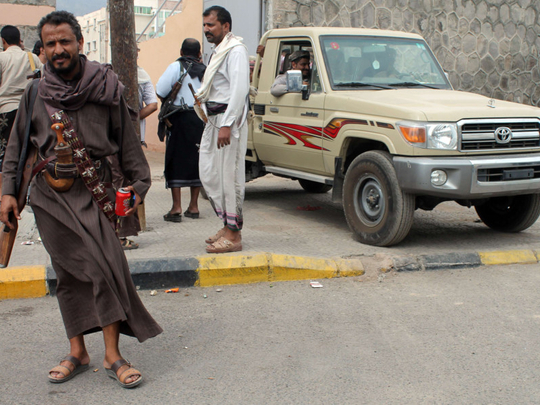
Al Mukalla: For Rami Lamlas, his troubled Yemen is teetering on the brink of wider civil war as violence expands to new areas in the south including his small city in the province of Shabwa.
Lamlas, a young doctor at a local hospital in Attaq city, the capital of Shabwa, told Gulf News that he is worried that violence may erupt in the city when advancing Al Houthi fighters approach Attaq.
“The situation is very bad,” he said, as armed Sunni tribes were prepared to attack approaching Al Houthi fighters.
Yemen has experienced a new wave of violence after Al Houthi rebels who control the Yemeni capital decided to besiege president Abd Rabbo Mansour Hadi in his newly declared capital, in Aden. Hadi escaped Al Houthi house arrest on February 21 and quickly received support from local political forces and international community.
After Hadi’s declaration, Al Houthi leader Abdul Malik Al Houthi called for an offensive to sweep up territory in the south, taking control of the Taiz province before pushing towards Aden.
It was only until air strikes led by Saudi Arabia that the rebel’s advance to Aden was curbed. However, they continue their advance on other southern provinces.
On Friday, Al Houthis aided by forces loyal to the former president Ali Abdullah Saleh entered the city of Bayhan, Shabwa province, not too far from Lamlas’s hometown.
“We will be in big trouble if clashes erupt in Attaq. The hospital isn’t properly equipt with medical supplies and drugs,” Lamlas said.
Despite the growing violence across the country, some provinces still enjoy considerable peace and tranquility. In the southern eastern Hadramout, the largest province in Yemen, Abdullah, a security officer who preferred to be known by his first name only, said that he blames Al Houthis and Saleh for the “bad” situation in Yemen, blaming the situation on ‘their appettite for power’.
For Abu Yaslem, who runs a small travel agency in the port city of Al Mukalla, Umra and Haj services are a lifeline for his agency, which have been halted amid the ongoing clashes.
Like with many other thorny issues that ravage the country, Yemenis are divided over the air strikes.
Lamlas worries the air strikes could turn Yemen into another Iraq and Yemenis will be swept up into a vortex of violence.
Abu Yaselm disagreed and says the Saudis should not stop until both Abdul Malik Al Houthi and former Yemeni President Ali Abdullah Saleh are captured and prosecuted for war crimes.












